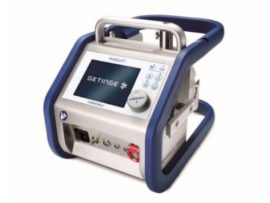Abstract OBJECTIVES: Although existing guidelines recommend commencing cannulation for extracorporeal cardiopulmonary resuscitation (ECPR) within 10–20 minutes of failed conventional resuscitation efforts for cardiac arrest, there is little supportive evidence. The present study..
Read MoreAbstract Background Multiple randomized clinical trials have compared specific airway management strategies during ACLS with conflicting results. However, patients with refractory cardiac arrest died in almost all cases without the..
Read MoreAbstract Background In adults with refractory out-of-hospital cardiac arrest, when conventional cardiopulmonary resuscitation (CPR) alone does not achieve return of spontaneous circulation, extracorporeal CPR is attempted to restore perfusion and..
Read MoreAbstract Objective This systematic review and meta-analysis aimed to investigate the role of regional cerebral oxygen saturation (rSO2) in predicting survival and neurologic outcomes after extracorporeal cardiopulmonary resuscitation (ECPR). Design..
Read MoreAbstract BACKGROUND Extracorporeal cardiopulmonary resuscitation (CPR) restores perfusion and oxygenation in a patient who does not have spontaneous circulation. The evidence with regard to the effect of extracorporeal CPR on..
Read MoreAbstract Extracorporeal cardiopulmonary resuscitation (E-CPR) is the establishment of veno-arterial extracorporeal membrane oxygenation (ECMO) during ongoing cardiopulmonary resuscitation (CPR). E-CPR is the last rescue therapy when, despite high-quality conventional CPR,..
Read MoreAbstract Impact Between the Favorable and Unfavorable criteria for initiating ECPR and Clinical Outcomes
Read MoreAbstract Importance: Out-of-hospital cardiac arrest (OHCA) has poor outcome. Whether intra-arrest transport, extracorporeal cardiopulmonary resuscitation (ECPR), and immediate invasive assessment and treatment (invasive strategy) is beneficial in this setting remains uncertain...
Read MoreAbstract Background: The use of extracorporeal membrane oxygenation (ECPR) in refractory out-of-hospital cardiac arrest (OHCA) patients is usually implemented in-hospital. As survival in ECPR patients is critically time-dependent, alternative models..
Read MoreAbstract Introduction There is increasing evidence for extracorporeal cardiopulmonary resuscitation (ECPR) as a rescue therapy for selected patients in refractory cardiac arrest (CA). Besides patient selection, the control of reperfusion..
Read MoreAbstract Aims The long-term outcomes of patients treated with extracorporeal cardiopulmonary resuscitation (ECPR) for refractory ventricular tachycardia/ventricular fibrillation (VT/VF) out-of-hospital cardiac arrest (OHCA) remain poorly defined. The purpose of this..
Read MoreAbstract Background: Survival rates in refractory out-of-hospital cardiac arrest (OHCA) remain low with conventional advanced cardiac life support (ACLS). Extracorporeal life support (ECLS) implantation during ongoing resuscitation, a method called..
Read MoreAbstract Focused cardiac ultrasound is an important aspect of the comprehensive management of patients with cardiac arrest, especially in patients selected for extracorporeal cardiopulmonary resuscitation (eCPR). It guides physician during..
Read MoreAbstract Background: This study aimed to estimate the cost-effectiveness of extracorporeal cardiopulmonary resuscitation (ECPR) for in-hospital cardiac arrest treatment. Methods: A decision tree and Markov model were constructed based on current literature...
Read MoreAbstract Aim Extracorporeal cardiopulmonary resuscitation (ECPR) is performed in refractory out-of-hospital cardiac arrest (OHCA) patients, and the eligibility has been conventionally determined based on three criteria (initial cardiac rhythm, time..
Read MoreAbstract Extracorporeal cardiopulmonary resuscitation (eCPR) can improve survival in selected patients with cardiac arrest (CA). In this meta-analysis, we evaluated factors associated with short-term survival and favorable neurologic outcome (FNO)..
Read MoreAbstract Objectives The aim of this study was to develop and validate a score to accurately predict the probability of death for adult extracorporeal cardiopulmonary resuscitation (ECPR). Background ECPR is..
Read MoreHypoxic-ischemic brain injury is the main cause of death or disability in patients resuscitated from cardiac arrest (CA). Veno-arterial extracorporeal membrane oxygenation (VA ECMO) may be used as a mechanical support for..
Read MoreContext Poisoning may lead to respiratory failure, shock, cardiac arrest, or death. Extracorporeal membrane oxygenation (ECMO) may be used to provide circulatory support, termed venoarterial (VA) ECMO; or respiratory support..
Read MoreAbstract Evaluate the utility of whole-body computed tomography (WBCT) imaging in detecting clinically significant findings in patients who have undergone extracorporeal membrane oxygenation (ECMO) cannulation for cardiac arrest (extracorporeal cardiopulmonary..
Read MoreAbstract Extra Corporeal membrane oxygenation (ECMO) is one of the most advanced forms of life support therapy in the Intensive Care Unit. It relies on the principle where an external..
Read MoreDr. Hany Samir lectures and discusses the use of ECPR (Extracorporeal Cardio Pulmonary Resuscitation) for sudden cardiac arrest. Dr. Samir discusses special consideration and outcomes associated with ECPR (Extracorporeal Cardio Pulmonary..
Read MoreAbstract The use of extracorporeal cardiopulmonary resuscitation (ECPR) to restore circulation during cardiac arrest is a time-critical, resource-intensive intervention of unproven efficacy. The current COVID-19 pandemic has brought additional complexity..
Read MoreAbstract Aim To assess the use of (ECPR), compared with manual or mechanical cardiopulmonary resuscitation (CPR), for (OHCA) and in-hospital cardiac arrest (IHCA) in adults and children. Methods The PRISMA guidelines were..
Read More











